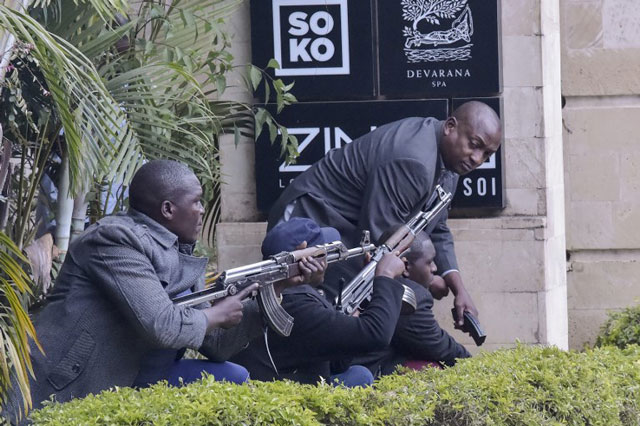
Mogadishu, Somalia | AFP | The Al-Shabaab, meaning “youth” in Arabic, is fighting an armed insurrection in Somalia, which has been mired in chaos since 1991.
Here is some background on the Islamist group with links to Al-Qaeda.
– Al-Qaeda links –
The Shabaab stem from Somalia’s Islamic Courts that controlled central and southern Somalia including the capital Mogadishu for six months in 2006 before being ousted by Ethiopian troops.
In 2010 the Shabaab declared their allegiance to Al-Qaeda, to which it was officially integrated in 2012.
It is estimated to count between 5,000 and 9,000 men.
Since the death in September 2014 of Ahmed Abdi Godane, killed in a US strike, their leader has been Ahmed Diriye.
The Shabaab were chased out of Mogadishu in 2011 by the 22,000-strong African Union peace-enforcement mission, AMISOM — in Somalia since 2007 — and since then they have had to abandon most of their strongholds.
They nevertheless control vast rural areas and remain the key threat to peace in Somalia.
In October 2017 a truck bombing in a busy neighbourhood of Mogadishu killed over 500 people in the deadliest attack in Somalia to date.
The Shabaab have intensified their activity since the start of 2016 and Somalia’s President Mohamed Abdullahi Mohamed, elected in February 2017, has declared a state of war against the group.
In March 2017 US President Donald Trump authorised the Pentagon to take action against suspected militants in Somalia and since then US forces have conducted a series of air strikes against the Shabaab.
On October 12, 2018 one of these strikes killed around 60 militants, according to the US army.
– Shabaab targets Kenya –
The Shabaab began a spate of bloody attacks in neighbouring Kenya since its troops intervened in Somalia in 2011.
The deadliest of these took place on April 2, 2015 when the Shabaab killed 148 people at Garissa University in northeastern Kenya.
In June-July 2014 around 100 people were killed in raids in the coastal Lamu region in Kenya’s northeast, home of a once-popular tourist island.
In September 2013 the Shabaab claimed responsibility for a dramatic raid on the Westgate shopping mall in Nairobi that killed 67 people over a four-day seige.
– Other countries under attack –
In 2010 the Shabaab claimed responsibility for a twin attack in Kampala, the capital of Uganda and main contributor to AMISOM.
The suicide bombings in two restaurants in Kampala on July 11 killed 76 people and injured more than 80. It was the first major Shabaab attack outside its borders.
On May 24, 2014 the Shabaab claimed responsiblity for an attack in Djibouti on a restaurant packed with Westerners, saying it had targeted French “crusaders” and was also in retaliation for Djibouti’s hosting of the United States’ biggest military base in Africa.
 The Independent Uganda: You get the Truth we Pay the Price
The Independent Uganda: You get the Truth we Pay the Price



